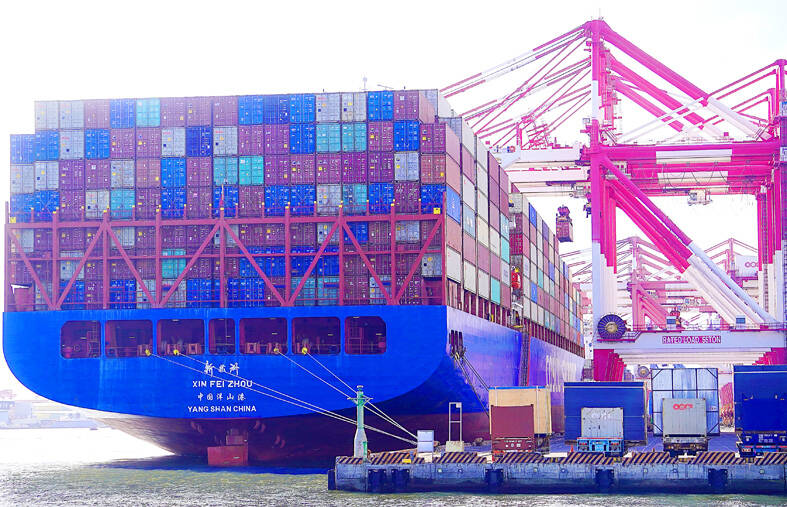Exports last month spiked 31.5 percent from a year earlier to a record US$41.31 billion, fueled by strong demand for artificial intelligence (AI), frontloading activity and a low base linked to the Lunar New Year, the Ministry of Finance said yesterday.
Exports, a key growth driver in Taiwan, had expanded for 16 months, but might temporarily slip into contraction this month because of a high base and global unease over US trade policy, Department of Statistics Director-General Beatrice Tsai (蔡美娜) said.
“Exports [last month] proved way better than we expected and ran counter to the traditional slow seasonality for the current quarter,” Tsai told an online media briefing.

Photo: CNA
All product categories registered positive growth with information communications technology products soaring 65.5 percent year-on-year to a new peak of US$14.07 billion, the ministry’s report showed.
Active investment by US technology giants to build AI capability accounted for the upward trend and allowed the US to overtake China as Taiwan’s largest export destination, Tsai said.
Shipments to the US swelled 65.6 percent to US$11.77 billion, underpinning 28.5 percent of overall exports, and surpassing the US$11.72 billion destined for China and Hong Kong combined at 28.4 percent, she said.
The US might have long grown into the largest export market if including shipments bound for Mexico, Tsai said, adding that Taiwanese suppliers of electronics and car parts have expanded their presence in Mexico in recent years to take advantage of its favorable tax terms with the US.
That helped explain why exports to Mexico exploded 130 percent to US$939 million, Tsai said.
Meanwhile, South Korea replaced Japan to become Taiwan’s fourth-largest trade partner in terms of imports, as local tech firms rely on its high-bandwidth memory used in AI, Tsai said.
Fast-expanding AI applications are reshaping the world’s technology map and product cycle, she said.
Imports delivered a faster 47.8 percent hike to US$34.76 billion, giving Taiwan a trade surplus of US$6.55 billion, marking a 17.1 percent retreat from a year earlier, the ministry said.
The data came after local tech firms aggressively bought capital equipment, particularly semiconductor equipment, which expanded 140.2 percent and 234.4 percent respectively from the year before, it said.
Taiwan is responsible for manufacturing more than 95 percent of the world’s advanced chips used in AI and high-performance computing, and major local players said they need to expand capacity to meet business needs.
In the first two months of this year, exports increased 16.8 percent to US$11.52 billion and imports rose 9.3 percent to US$63.49 billion, poised for a record showing and above the forecast the Directorate-General of Budget, Accounting and Statistics set for this quarter, Tsai said.

In Italy’s storied gold-making hubs, jewelers are reworking their designs to trim gold content as they race to blunt the effect of record prices and appeal to shoppers watching their budgets. Gold prices hit a record high on Thursday, surging near US$5,600 an ounce, more than double a year ago as geopolitical concerns and jitters over trade pushed investors toward the safe-haven asset. The rally is putting undue pressure on small artisans as they face mounting demands from customers, including international brands, to produce cheaper items, from signature pieces to wedding rings, according to interviews with four independent jewelers in Italy’s main

Japanese Prime Minister Sanae Takaichi has talked up the benefits of a weaker yen in a campaign speech, adopting a tone at odds with her finance ministry, which has refused to rule out any options to counter excessive foreign exchange volatility. Takaichi later softened her stance, saying she did not have a preference for the yen’s direction. “People say the weak yen is bad right now, but for export industries, it’s a major opportunity,” Takaichi said on Saturday at a rally for Liberal Democratic Party candidate Daishiro Yamagiwa in Kanagawa Prefecture ahead of a snap election on Sunday. “Whether it’s selling food or

CONCERNS: Tech companies investing in AI businesses that purchase their products have raised questions among investors that they are artificially propping up demand Nvidia Corp chief executive officer Jensen Huang (黃仁勳) on Saturday said that the company would be participating in OpenAI’s latest funding round, describing it as potentially “the largest investment we’ve ever made.” “We will invest a great deal of money,” Huang told reporters while visiting Taipei. “I believe in OpenAI. The work that they do is incredible. They’re one of the most consequential companies of our time.” Huang did not say exactly how much Nvidia might contribute, but described the investment as “huge.” “Let Sam announce how much he’s going to raise — it’s for him to decide,” Huang said, referring to OpenAI

Nvidia Corp’s negotiations to invest as much as US$100 billion in OpenAI have broken down, the Wall Street Journal (WSJ) reported, exposing a potential rift between two of the most powerful companies in the artificial intelligence (AI) industry. The discussions stalled after some inside Nvidia expressed concerns about the transaction, the WSJ reported, citing unidentified people familiar with the deliberations. OpenAI makes the popular chatbot ChatGPT, while Nvidia dominates the market for AI processors that help develop such software. The companies announced the agreement in September last year, saying at the time that they had signed a letter of intent for a strategic